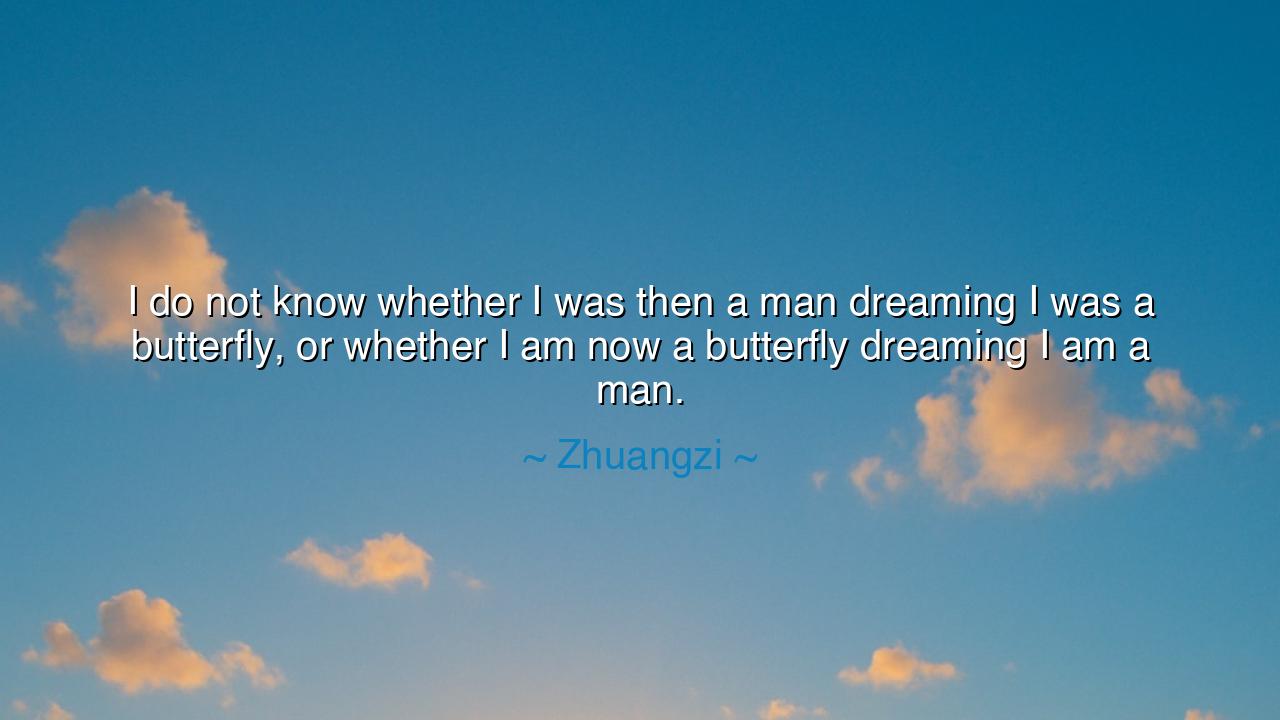
I do not know whether I was then a man dreaming I was a
I do not know whether I was then a man dreaming I was a butterfly, or whether I am now a butterfly dreaming I am a man.






In the dawn of Chinese philosophy, amid the gentle stillness of the rivers and the wisdom of mountains, Zhuangzi, the mystic sage of the Tao, told a story that has echoed through the centuries: “I do not know whether I was then a man dreaming I was a butterfly, or whether I am now a butterfly dreaming I am a man.” This is not merely a riddle of identity—it is a revelation of being. It asks, with the tenderness of wonder and the gravity of truth: What is real? What is the self? And perhaps most profoundly, what is the difference between waking and dreaming?
The origin of this quote comes from The Zhuangzi, one of the foundational texts of Taoist thought, composed over two thousand years ago in ancient China. Zhuangzi, a poet and philosopher of freedom, sought to liberate the mind from the illusions of distinction and control. In his story, he dreams of being a butterfly, fluttering freely through the air. Upon waking, he wonders which is real: the butterfly’s joy or the man’s reflection. His point is not confusion, but enlightenment—the realization that both states, dream and waking, belong to the same cosmic flow. For Zhuangzi, life itself is a dream, and awakening means seeing that the dreamer and the dream are one.
To Zhuangzi, reality is fluid, not fixed. The boundaries we draw—between self and other, waking and sleeping, life and death—are illusions created by the mind’s need for certainty. The Tao, the Way, embraces both the butterfly and the man, both the fleeting and the eternal. What he teaches, in his serene paradox, is that truth cannot be captured by logic alone; it must be experienced through stillness, acceptance, and union with the infinite. The butterfly’s flight is as real as the philosopher’s thought, for both arise from the same boundless source.
Across time, this teaching has found kinship with others who glimpsed the dreamlike nature of existence. René Descartes, centuries later, would ask a question born of the same mystery: “How do I know that I am not dreaming?” Yet where Descartes sought certainty, Zhuangzi sought freedom. He did not wish to prove the dream false, but to embrace it as a sacred part of life’s unfolding. Likewise, in modern times, physicists speak of perception and consciousness shaping reality itself—echoing Zhuangzi’s insight that the world is not merely seen by us, but created through us.
There is a quiet courage in Zhuangzi’s butterfly. For to live as he teaches is to surrender the illusion of control and embrace the mystery of transformation. The butterfly is not troubled by the question of identity—it simply flies. So too should we learn to live without clinging to definitions, possessions, or fears. One moment we are human, the next we are dream, the next we are something beyond both. The wise do not fear this shifting of form; they dance within it.
Consider, for example, Nelson Mandela, who spent decades imprisoned in darkness but emerged radiant, unbroken, transformed. He once said that “prison gave me time to dream,” and in that dream, the walls dissolved. He ceased to be merely a man confined; he became an idea free to fly across nations. Like Zhuangzi’s butterfly, he awakened not by resisting the dream, but by transcending it—understanding that the mind’s freedom is the truest form of liberation.
The lesson, then, is not to seek what is real but to awaken to the reality of all things. Be neither trapped by the world nor lost in illusion; instead, dwell in the space between, where the soul breathes freely. Recognize that what you call “you” is but one form of the eternal Tao—changing, dreaming, awakening, and dreaming again. Let the butterfly within you fly, unburdened by the need to define its wings.
So, my children of the Way, remember this teaching: life is both dream and awakening. When you act, act as the man; when you rest, rest as the butterfly. Know that neither is more real, for both belong to the same great mystery. As Zhuangzi whispered through his dream, the wise do not awaken from life—they awaken into it.






AAdministratorAdministrator
Welcome, honored guests. Please leave a comment, we will respond soon